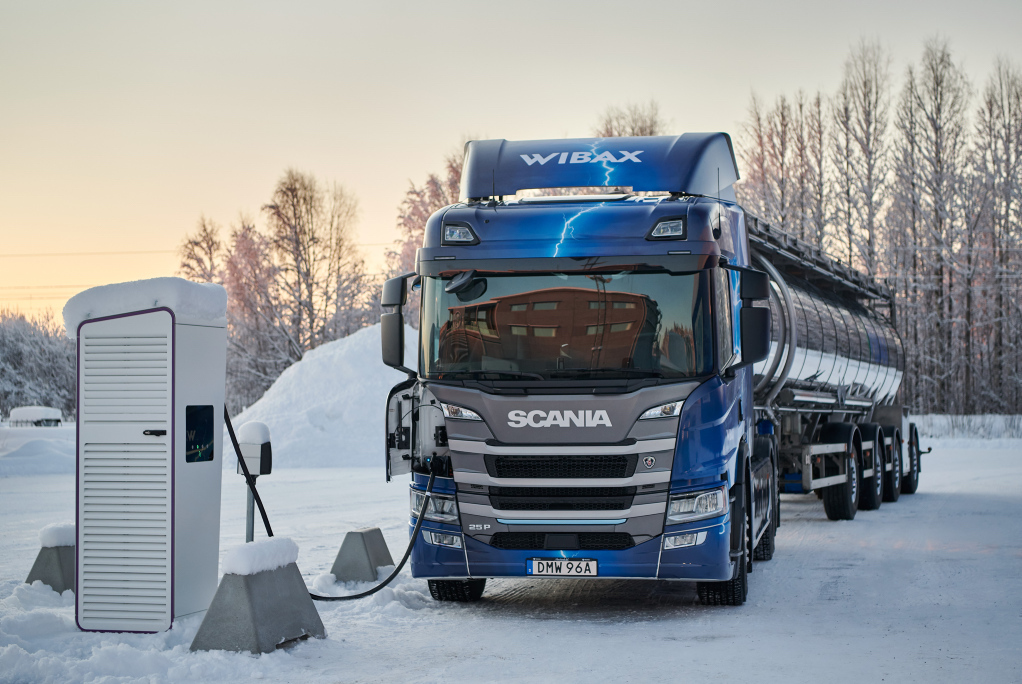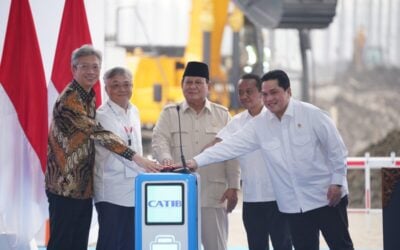
Update 10 February 2022: A Soltech representative responded to an Energy-Storage.news request for some more details on the project. It will use a lithium iron phosphate (LFP) 2MW/2MWh BESS made by Huawei, the representative said. It was also clarified that the solar farm being developed at the same time will be located about 30 miles from the EV charging park, adding another reason for it to not directly charge the charging station’s batteries. Primary application of the BESS will be for providing grid services including frequency control to tranmission system operator Svenska Kraftnät, the Soltech representative said.
Sweden’s largest electric vehicle (EV) truck charging park will be completed later this year with a 2MW battery energy storage system (BESS) and, approvals permitting, 500kW of connected solar, the CEO of the haulier behind it has exclusively told Energy-storage.news.
Enjoy 12 months of exclusive analysis
- Regular insight and analysis of the industry’s biggest developments
- In-depth interviews with the industry’s leading figures
- Annual digital subscription to the PV Tech Power journal
- Discounts on Solar Media’s portfolio of events, in-person and virtual
Falkenklev Logistik has hired solar solutions provider Soltech Energy to build the BESS while vehicle manufacturer Scania is developing the 22-DC-station in partnership with Finnish EV charging specialist Kempower, the companies announced last week.
The charging park with all grid connections will cost SEK18 million (US$2 million) while the BESS comes to SEK20 million, Falkenklev CEO Victor Falkenklev told Energy-storage.news. The Swedish environmental protection agency Naturvårdsverket is funding half of the park’s cost, according to Scania.
The storage and charging station are in addition to the ongoing development of a nearby 1.5 hectare solar park by Soltech for Falkenlkev, announced last month and costing SEK7.5m. The solar facility will feed electricity into the grid, rather than to the EV park.
Regarding the lack of connection with the charging park, Falkenklev says it is “shopping around for different electric companies that could buy the solar power from Perstorp and sell us a different solar power”.
Falkenklev’s is one of a growing number of projects attaching energy storage to EV charging parks to reduce peak load on local electricity grids and achieve carbon neutrality, either by pairing with renewables or simply better controlling when it charges from the grid.
Stationary energy storage in support of EVs could reach a global installed capacity of 1.9GW by the end of 2029, according to an August 2020 Guidehouse Insights report as covered by Energy-Storage.news.
Theirs isn’t the first EV-plus-storage project in Sweden but it’s much larger than the 220kW/320kWh BESS using lithium-ion attached to an EV charging station park in Vasteras, delivered in late 2020 by battery producer Northvolt and publicly-owned utility Mälarenergi. There, the BESS was intended to reduce peak electricity demand of the station by 80%.
Energy-storage.news reported on New York’s first such project, a 5MW/15MWh BESS connected to an 18-station EV charging park for which UK energy giant Centrica won a project tender in mid-2021, put out by utility Con Edison.
These projects aren’t limited to lithium-ion either. In November, pilots to pair vanadium flow batteries with EV charging stations in Australia and South Korea were announced.
But the holy grail for these kinds of projects is a direct pairing with a renewable power source, which would allow the low-carbon generation, storing and release of power in a self-contained system with as little reliance on the grid as possible.
Thought to be Europe’s largest EV charging station when it opened in November 2020, the Seed & Greet charging station in Germany pairs 336kWp solar PV, two wind turbines with a 2MWh BESS, powering 114 charging points. It uses a Tesvolt battery system with an expected lifecycle of 30 years.






